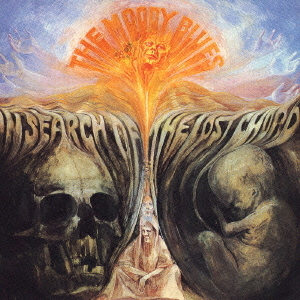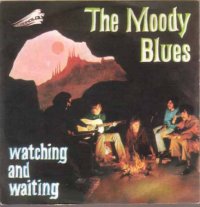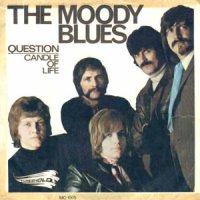
The Moody Blues were an English rock band formed in Birmingham in May 1964. The band initially consisted of drummer Graeme Edge, guitarist/vocalist Denny Laine, keyboardist/vocalist Mike Pinder, multi-instrumentalist/vocalist Ray Thomas, and bassist/vocalist Clint Warwick. Originally part of the British beat and R&B scene of the early–mid 1960s, the band came to prominence with the UK No. 1 and US Top 10 single "Go Now" in late 1964/early 1965. Laine and Warwick left the band by the end of 1966, being replaced by guitarist/vocalist Justin Hayward and bassist/vocalist John Lodge. They embraced the psychedelic rock movement of the late 1960s, with their second album, 1967's Days of Future Passed, being a fusion of rock with classical music that established the band as pioneers in the development of art rock and progressive rock. It has been described as a "landmark" and "one of the first successful concept albums".

A Question of Balance is the sixth album by the Moody Blues, released in 1970. The album reached No. 1 in the United Kingdom and No. 3 in the United States.

In Search of the Lost Chord is the third album by the Moody Blues, released in July 1968 on the Deram label.

To Our Children's Children's Children is the fifth album by the Moody Blues, released in November 1969.

Every Good Boy Deserves Favour is the seventh album by The Moody Blues, released in 1971. The album reached No. 1 on the British album chart, in addition to a three-week stay at No. 2 in the United States, and produced one top-40 single, "The Story in Your Eyes".

Raymond Thomas was an English musician, singer and songwriter. He was best known as a founding member of the English progressive rock band the Moody Blues. His flute solo on the band's 1967 hit single "Nights in White Satin" is regarded as one of progressive rock's defining moments. In 2018, he was posthumously inducted into the Rock and Roll Hall of Fame as a member of the Moody Blues.

Graeme Charles Edge was an English musician, songwriter and poet, best known as the co-founder and drummer of the English band the Moody Blues. In addition to his work with the Moody Blues, Edge worked as the bandleader of his own outfit, the Graeme Edge Band. He contributed his talents to a variety of other projects throughout his career. In 2018, Edge was inducted into the Rock and Roll Hall of Fame as a member of the Moody Blues.

John Charles Lodge is an English musician, best known as bass guitarist, vocalist, and songwriter of the longstanding rock band the Moody Blues. He has also worked as a record producer and has collaborated with other musicians outside the band. In 2018, Lodge was inducted into the Rock and Roll Hall of Fame as a member of the Moody Blues.

"I'm Just a Singer (In a Rock and Roll Band)" is a 1973 hit single by the English progressive rock band the Moody Blues, written by the band's bassist, John Lodge. It was first released in 1972 as the final track on the album Seventh Sojourn and was later released as a single in 1973, with "For My Lady" as its B-side. It was the second single released from Seventh Sojourn, with the first being "Isn't Life Strange", which was also written by Lodge.

"Watching and Waiting" is a 1969 single by the progressive rock band the Moody Blues, and was written by band members Justin Hayward and Ray Thomas.

"Question" is a 1970 single by the English progressive rock band the Moody Blues. It was written by guitarist Justin Hayward, who provides lead vocals. "Question" was first released as a single in April 1970 and remains their second highest-charting song in the UK, reaching number two and staying on the chart for 12 weeks. The song reached number 21 on the Billboard Top 40 in the USA. It was later featured as the lead track on the 1970 album A Question of Balance. The single also features the song "Candle of Life" on its B-side, which was from the Moody Blues' previous album To Our Children's Children's Children.
"Floating" is a song by the Moody Blues from their November 1969 album To Our Children's Children's Children, a concept album about space travel, dedicated to NASA and the Apollo 11 astronauts.
"Higher and Higher" is the opening track of the Moody Blues 1969 album To Our Children's Children's Children, a concept album about space travel.
"Gypsy (Of a Strange and Distant Time)" is a 1969 song by the progressive rock band the Moody Blues, from their album To Our Children's Children's Children, a concept album about space travel. The song was written by band-member Justin Hayward.
"Candle of Life" is a song by the progressive rock band the Moody Blues, from their album To Our Children's Children's Children, a concept album about space travel. "Candle of Life" was written by bassist John Lodge, and features both Lodge and Justin Hayward on vocals.
"Beyond" is a three-minute long instrumental song by the band the Moody Blues from their 1969 album To Our Children's Children's Children, a concept album about space travel. "Beyond" was written by the Moody Blues' drummer Graeme Edge. It was the Moody Blues' second fully instrumental song on one of their albums; the first was the song "The Voyage" from their previous album On the Threshold of a Dream. It was also the first released Moody Blues song written by Edge that did not involve spoken vocals.
"Eternity Road" is a song by the band the Moody Blues, written by band member Ray Thomas, from their 1969 album To Our Children's Children's Children.

Michael Thomas Pinder was an English rock musician. He was a founding member and the original keyboard player of the rock group the Moody Blues. He left the group following the recording of the band's ninth album Octave in 1978. Pinder was renowned for his technological contributions to rock music, most notably in the development and emergence of the Mellotron in 1960s rock music. In 2018, he was inducted into the Rock and Roll Hall of Fame as a member of the Moody Blues. He was the last surviving member of the group's original lineup.

"Melancholy Man" is a song written by Mike Pinder that was first released on the Moody Blues' 1970 album A Question of Balance. It was also released as a single in some countries, but not in the UK or US, although in the US it was later released as the b-side of "The Story in Your Eyes".












